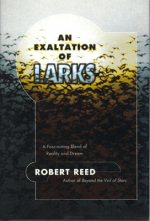For a long time I thought the weirdest book in the world was Robert Sheckley’s Mindswap, in which a retiring college professor does a holiday mind swap with a colleague on Mars, only to find when he gets there that the colleague doesn’t exist and his own body back on Earth has disappeared—and things get weirder from there on, and don’t stop being weird by the end of the book. Then I discovered R.A. Lafferty and thought nobody could ever be weirder.
In 1995, Lafferty lost his title. Robert Reed wrote An Exaltation of Larks, which really did seem to be the weirdest book in the world, making Sheckley and Lafferty seem positively normal in comparison.
Robert Reed is an absolutely brilliant writer. I think he may well be the greatest living writer of short SF, edging out Ted Chiang by a nose. Stories like “A Plague of Life” and “Veritas” are why I buy SF magazines. Gardner Dozois has said he could publish a “Best Robert Reed of the Year” collection every year. He’s phenomenally wonderful, up to about 10,000 words. After that it’s as if you can hear him thinking, “Oh. Better throw in something else now. Something new.” Sometimes this works really well, as in Sister Alice and Marrow, where the recomplications just make the books better. Other times, as in Down the Bright Way, you find yourself thinking at the recomplications, “You know, this might have been enough for any normal person?” Then there’s An Exaltation of Larks, which is brilliantly written, fascinating, and essentially becomes a new genre every 10,000 words. It starts off on a college campus with weird things happening, and whenever you think you have some idea what’s going on, you just don’t. There’s a section where the characters are alien turtles floating in space. It has been, for more than a decade, the indisputable weirdest book in the house.
But I may have just read something that beats it for sheer unadulterated oddity.
Kathleen Norris (1880-1966) was an American “women’s writer” of the early twentieth century. Her novels are odd romances set in an era after divorce but before divorce was acceptable, after automobiles but before air conditioning and penicillin. To someone used to Victorian novels and modern ones, they have a fascinating level of morality—in one of them, someone lusts in his heart and is falsely accused of murder and, eventually exculpated, he dies of TB caught in prison. Rich people have interesting trouble passing through eyes of needles. Adultery is a perpetual problem. Love is not enough, and neither is money.
I read half a dozen of Norris’s books from the library, just for fun. (I do this sometimes.) The last one I randomly picked off the shelf was Through a Glass Darkly, which is science fiction and, you guessed it, my new contender for the weirdest book in the world.
There’s a utopian world which is an alternate America that didn’t fight the Spanish/American war and which has always made peace ever since. It’s socialist to the point of having free food for everyone, and in a way that clearly grows out of Norris’s experience of having lived through the Depression writing cheerful books about rich people’s love troubles. This alternate world also happens to be Heaven, or one of the Heavens—there are at least seven, as everyone knows. People are born and die there, but people also arrive there from our world when they have died here in a particularly good way. Our hero, a young trainee doctor, turns up there after having died heroically in the battle of Midway. He is shown around in a typical mainstream-writer-writes-utopia visitor way, having how everything works explained to him.
He then sets out to practice as a doctor, his training being miraculously complete. (Don’t ask.) He falls in love with a married woman and angsts about this at great length. Then he falls in love with and gets engaged to her daughter. The daughter finds out about the mother and allows herself to be swept away in a flood (where she’s rescuing some kids) and drowns, and is reborn in our world. There she grows up in New York and becomes a nurse, is seduced and marries someone else to give her baby a name. In the end she realises she loves the someone else after all.
That’s it. Two-thirds of the book takes place in the ideal otherworld, and one third in our world. There’s no frame closure.
If you have contenders for books weirder than this, do let me know.










